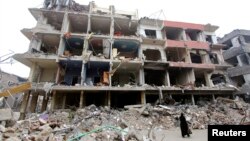World governments failed to protect civilians from violence by states and armed groups, Amnesty International said Wednesday, calling the global response "shameful and ineffective."
In its annual report, the human rights watchdog called 2014 a "catastrophic" one for millions of people around the world.
"As people suffered an escalation in barbarous attacks and repression, the international community has been found wanting,'' Amnesty secretary general Salil Shetty said in a statement.
Refugee Crisis
The report said millions of civilians suffered horrific violence and human rights violations from Syria to Ukraine, Gaza to Nigeria, while the number of displaced people around the world exceeded 50 million last year for the first time since the end of World War II.
2014 Amnesty International Report
In 2014, Amnesty International recorded and investigated human rights abuses in 160 countries and territories worldwide. These are some of the findings:
* War crimes or other violations of the “laws of war” were carried out in at least 18 countries.
* Armed groups committed abuses in at least 35 countries, more than 20 percent of the countries Amnesty International investigated.
* 119 countries arbitrarily restricted freedom of expression, including jailing of journalists and forced closures of media outlets.
* 62 governments held prisoners of conscience -- people who were simply exercising their rights and freedoms.
* 93 countries conducted unfair trials.
* 131 countries tortured or otherwise ill-treated people.
* 28 countries around the world have laws that completely ban abortion even in cases where a woman’s life or health is in danger and in cases of rape.
* 78 countries have laws in effect that are used to criminalize consensual sexual relationships between adults of the same sex.
Source: Amnesty International
It criticized the European Union's response to the 4 million Syrian refugees displaced by conflict in the world's worst refugee crisis. By the end of 2014, only 150,000 Syrian refugees were living in EU states, it said, while 3,400 refugees and migrants had died in the Mediterranean Sea trying to make their way to Europe.
"It is abhorrent to see how wealthy countries’ efforts to keep people out take precedence over their efforts to keep people alive," Shetty said.
Amnesty singled out the United Nations Security Council for criticism, with Shetty saying it had "miserably failed" to protect civilians.
UN Security Council
The five permanent Security Council members -- Britain, China, France, Russia and the U.S. -- "consistently abused" their veto right to "promote their political self-interest or geopolitical interest above the interest of protecting civilians," he said.
The report pointed out that the threat of a Russian veto has made it impossible for the Security Council to take any action because of events unfolding in Ukraine.
Amnesty is now urging the five states to give up their right to veto action in cases where genocide and other mass killings are being committed.
Armed Conflicts
The report said armed groups committed abuses in at least 35 countries -- out of 160 surveyed -- in 2014, and called the rise of the Islamic State militant group a particular concern.
The report said the Islamic State group committed wide-scale war crimes, including mass summary killings and abductions that targeted minorities.
The militants also killed members of the Sunni community they suspected of opposing them, the report said.
Hundreds of women and girls were subjected to sexual abuse by Islamic State fighters.
A huge number of arms were delivered to Iraq, Israel, Russia, South Sudan and Syria in 2014, despite the likelihood of these weapons being used against civilians, it said.
The report also highlighted how several governments, including Kenya and Pakistan, reacted to security threats with "Draconian and repressive" tactics.
Call to Action
Shetty said world leaders "have it in their power to alleviate the suffering of millions" by committing enough political and financial resources.
"The global outlook on the state of human rights is bleak, but there are solutions. World leaders must take immediate and decisive action to avert an impending global crisis," he said.




